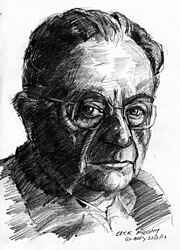User:Rigorousmortal/sandbox
Erich Fromm | |
|---|---|
 Fromm in 1970 | |
| Born | Erich Seligmann Fromm March 23, 1900 |
| Died | March 18, 1980 (aged 79) |
| Era | 20th century |
| Region | Western philosophy |
| School | Frankfurt School, critical theory, humanistic psychoanalysis, Humanistic Judaism |
Main interests | Humanism, Social theory, Marxism |
Notable ideas | Being and Having Modes of Existence, Security versus Freedom, Social character, Character orientation |
Almitra Patel's landmark 1996 PIL[clarification needed] in the Supreme Court against open dumping of municipal solid waste was instrumental in the drafting of the Municipal Solid Waste Management Rule.
Until 1991, Almitra like many other city dwellers in India did not know what happens to the garbage a city generates, until some of it landed near the village she lived. Instead of demanding that it not be dumped in her backyard, she set out to find a solution for hygienic municipal solid waste management, and found that most of the 80 Indian cities she visited in 1994-1995, had no where to dump their waste except in the outskirts of the city or approach roads.[1]
Education
Born in 1936, Almitra’s growing up years were filled with science. When she was in class 5 in a co-education school, all the boys were allotted science as a subject and girls were allot housecraft. However, being a left hander, sewing was a tricky proposition for Almitra. Her father, Pheroze Sidhwa, spoke to the school and asked for his daughter to study science. She and her cousin ended up being the first two girls in Barnes High School to study science.
Her father who had founded Bharat Tiles in 1922 was keen on creating engineers for India and sent his daughter to MIT to pursue higher studois in ceramics. In a record 3 years and a summer, she had finished her BS in General Engineering and MS in Ceramics from the world renowned institution. In 1959, Almitra Patel became the first Indian woman engineer to graduate from Massachusetts Institute of Technology (MIT).
Career
In the next 3 decades, she worked in the fields of Abrasives, Foundry-Refractories and Cement Tile industries.Almitra credits her mother Tehmi as a role model, an independent and remarkable woman who was always engaged in civic issues, and also founded and ran the Saraswati Education Society growing it from 40 students IN 1949 to 4000 students when she died in 2000.
Since the 1970’s Almitra was also involved in in environmental issues such as saving the Gir lions, being a tree warden, saving Ulsoor lake, solid waste management, building low cost homes, etc. A successful career doesn’t end. Almitra went on to being active in environmental policy advocacy. She is currently engaged in solid waste management issues in various think tanks and government panels.[2]

